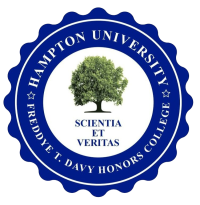About
Since its inception in 1986, The Honors College (renamed the Freddye T. Davy Honors College in 2011) has grown and earned the respect of the campus community. It has become a justifiable source of pride for all of us. You can help sustain this growth by encouraging other qualified students to join. You can uphold its fine reputation by continuing to develop in yourself the qualities of the true scholar: integrity, humility, curiosity, energy, and self-discipline.
The mission of Hampton University is “promoting learning, building character, and preparing promising students for positions of leadership and service.” The Hampton University Freddye T. Davy Honors College is committed to providing university experiences that support the Hampton University mission by cultivating excellence and nurturing the life of the mind.
Freddye T. Davy Honors College objectives are as follows:
- To improve the academic environment of the university as a whole.
- To provide opportunities for motivated, high-achieving students to engage in challenging academic experiences through stimulating discussions, critical thinking, free inquiry and investigations.
- To emphasize enrichment through classes with limited enrollment, thereby fostering increased class participation and enhancing opportunities for firsthand experiences.
- To insure further development and refinement of communication and research skills.
- To support and encourage strong leadership skills.
- To encourage and promote the student’s active involvement in the wider community.
- To reward and encourage hard-earned academic achievement of high-ability students through special advising, nurturing, and perquisites.
These objectives are reflected in the expectations and competencies that an Honors Scholar who graduates from the program must demonstrate:
- Ability to write effectively.
- Ability to speak effectively.
- Ability to analyze and synthesize a broad range of material.
- Ability to formulate a problem, develop a plan of action, and prove, support or disprove a hypothesis.
- Ability to take greater responsibility for his/her own learning.
Freddye T. Davy Honors College is designed to provide students with opportunities to interact with peers and faculty on a variety of levels within the academic community.
The Great Legacy of Freddye T. Davy

Davy, after 34 years of service in the public schools in Arkansas, the District of Columbia, and Maryland, came to Hampton University in 1994.
Dr. Davy explains her philosophy of teaching in this manner: “I embrace taking a student from where he is to where he would not go himself. My primary job is to provide exposure and experience. I watch to see what students will get into, then all I have to do is guide them and let that take shape.”
Prior to her post at HU, Dr. Davy spent seven years at Benedict College in Columbia, SC and served as visiting lecturer at the University of Nigeria in 1993. Although the concept of Honors College was established at HU in 1986, it was under her leadership that the requirements and structure of the concept were put into action. The Honors College curriculum was developed, seminars were initiated, and rites and rituals for induction and graduation were instituted. An eternal optimist, she had no idea the concept presented in 1986 would blossom as it has into a full-fledged component of the University.
Dr. Davy, in addition to directing the Honors College program, is the founder and executive director of the National W. E. B. Du Bois Honor Society. Chartered March 1, 2001, the Du Bois Honor Society is a program for pre-college students that recognizes, encourages, and promotes scholastic achievement, leadership development, and active involvement in positive community activities that solidly promote life-long learning skills. She earned a Bachelor’s degree from Philander Smith College, a Master’s from the University of Maryland and a Doctorate from Vanderbilt University. Dr. Davy has earned an esteemed title of Endowed University Professor.
In addition to participating in enriched courses with others of a similar scholastic attitude, the student may receive or take advantage of the following:
- Special honors designation on transcript, commencement certificate, and commencement program that will attract special attention from graduate schools and employers.
- Individualized assistance in preparing resumes and/or applications for fellowships and postgraduate study.
- Priority in course selection at each semester’s registration.
- Individualized advising.
- Eligibility for scholarships and internships.
- Fee waiver for transcripts.
- Some priority in housing selection.
- Special honors cords and medallions to be worn with graduation regalia.
- Subsidized honors program and honors conference expenses.
- Increased limits in Harvey Library.
- Participation in special events, field trips, and social activities.
- Recognition during Honors Day Convocation.
- Honors newsletter.
- An Honors College lapel pin.
